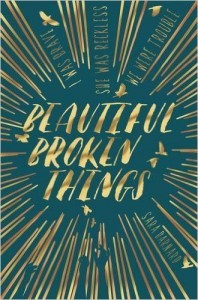Book review: Beautiful Broken Things
There are not nearly enough YA novels about the passionate intense friendships that characterise so many teenagers’ lives, where it’s not just the people you’re kissing but the people you sneak around with, or share secrets with, or fight with, who occupy your thoughts and feelings. Sara Barnard’s debut novel is about female friendships in all their intensity – from the hero-worship and resentment of a new girl arriving into the mix, to the exhilaration of having a friend who makes you brave and inspires you to have the kind of adventures and significant life experiences you’ve always wanted.
Caddy is sixteen, and a nice girl – a quiet, uneventful sort who goes to a private school and excels academically but isn’t as much of an overachiever as she’s expected to be, in that environment. She dreams of having things happen to her, of losing her virginity and falling in love, of being the sort of interesting person that her best friend Rosie is. Caddy knows that bereavement and mental illness don’t make your life more worthwhile, but yet she’s fascinated by trauma in a way she can’t quite articulate – and perhaps a little guilty and jealous at the same time for not having anything of the sort in her own life.
Rosie’s new friend Suzanne is at first a source of worry for Caddy. Suzanne is beautiful and sarcastic and fun – infinitely more fun than Caddy. Suzanne attends the same (normal, non-overachieving) school as Rosie. Suzanne is a threat. But after a little online stalking, Caddy discovers that there’s something troubling in Suzanne’s background, and manoeuvres a group conversation to prompt Suzanne to get upset, and then reveal, the abuse she suffered within her family and explain why she’s now living with an aunt.
Caddy doesn’t quite want to ‘save’ Suzanne, but there’s also another part of her that feels privileged to be chosen as her friend, to be the one trusted enough to hear some of the secrets and join her on midnight wanderings. The friendship that develops is as intense as any crush and just as potentially heartbreaking; after a fight where Caddy realises she hasn’t been included in all of the secrets, and Suzanne lashes out at her, she reflects:
“There’s something deeply upsetting about having your deepest insecurities not just laid bare by a friend but thrown in your face. I knew I was not in any way exciting, that there was nothing going on in my life that could be remotely confused with interesting. I’d always worried that this made me boring and that that was what people thought of me: Caddy Oliver – nice, but dull. And now, clearly, that was true.”
Being Suzanne’s closest friend is hard work. Caddy understands that her life is difficult – but she’s also not privy, until much later, to some of the more upsetting and dangerous elements of Suzanne’s behaviour. And she wants to support her friend without letting her get away with murder: after an apology from Suzanne, Caddy thinks, “I didn’t say anything, torn between reassuring her that I wasn’t about to desert her and pointing out that she’d acted like a bitch.” The fact that her parents disapprove of the friendship doesn’t help – Caddy finds it hypocritical that her mother, who works with the Samaritans, isn’t interested in helping someone in real life; her father, a doctor, is equally more concerned with saving people at work than in seeing what’s going on at home. What’s wrong with being a good friend to someone who clearly needs one?
This is in some ways Jacqueline Wilson’s Bad Girls for an older audience, and in other ways like stepping back into your teenage brain. The authenticity of the girls’ exchanges – the in-jokes, the intense appreciation for one another, the bitchiness – is incredible. Beautiful Broken Things is already one of my favourite YA books of 2016.




